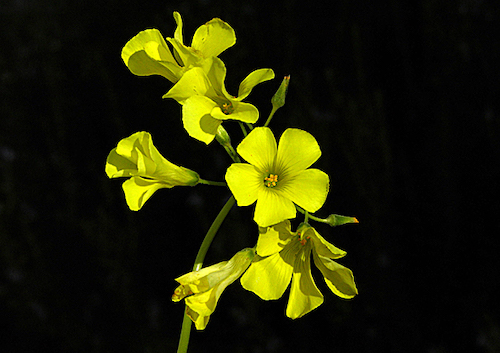Peace in our world is now seriously threatened by countries who do not want to abandon their cruel expansionism. Lesvos too is being invaded. Not by a foreign nation or a neighbouring island, but by an invasive plant, originally from South Africa: Oxalis pes-caprae, also known by the names African wood-sorrel or Bermuda buttercup.
Lesvos has about 40,000 hectare with silver green olive trees, covering about 41% of the cultivated land. There are olive groves all over the island: on fields kissing the sea, stretching lazily over hilltops or in the mountains’ tailor-made terraces. They not only provide olives and oil but especially in spring they offer a great space for wild flowers.
Lesvos has about 1,460 different kinds of plants and a large group of them likes to grow under the protection of the olive trees. In spring dandelions, buttercups, orchids, daisies and lots of other, lesser known, flowers also do feast under the olives — like the African wood-sorrel who also loves olive groves. When this intruder joins the party there is soon no other plant left.
This attacker looks like clover, but the only good luck ever brought was in bad times: farmers added them to soups and stews in times of war and famine. It is the underground bulbs (as big as a peanut) that are edible and which do most of the work: growing and spreading. That is why it is so easy for them to advance as an invisible enemy through more and more olive groves.
Another name of the plant is sourgrass, because of its sour taste. In South Africa it is one of the ingredients for the traditional stew waterblommetjiebredie, which may be the only culinary tour de force of this plant. In general gourmands do not appreciate its taste. The only benefit is provided by the yellow flowers, that can be used to dye fabrics.
And they can help to conquer lands. They are one of the first spring flowers and it might be nice to see a landscape turning yellow with flowers, but sourgrasses do push the endemic vegetation away. More than one study has proven that they not only reduce the number of different species of wild flowers in the olive groves and other fields, they also impoverish the earth.
Even worse: they are difficult to stop. I know from my own experience that to eliminate them by hand is no option: the following year they will return in double numbers. Glyphosate, an organophosphorus compound that farmers like to sprinkle around, is one of the few substances that can help to get rid of The Bermuda buttercup. The most infamous herbicide with glyphosate is Roundup made by Monsanto, which is said to be carcinogenic. That is why in many countries Roundup is forbidden, even though it has never been proved that it is pure poison. In Greece however you still see plenty of pots of Roundup sold in the stores.
Roundup would have been a solution for this problem. There are scientists who say that this herbicide can make the African wood-sorrel disappear without hurting nature, so that the local vegetation can return. But Monsanto is a mighty company that is also known for bribing scientists.
If we want to defeat this green enemy, we need to find better solutions so that this aggressive plant cannot end the red poppy fields, kill the very few tulip fields, besiege the wild gladioli, threaten rare orchids or destroy the daisies on the island.
Spring is in the air, the first anemones shyly show their pink, rose and white colours, even though the white snowdrops have not vanished yet. The first pink almond blossoms wink from their trees and a purple rock rose has already unfolded its petals. But the largest mass of flowers to be seen is bright yellow: Oxalis pes-caprae.
Lesvos used to be called the Island of Olives. But when the Bermuda buttercup continues invading olive groves without being stopped, the island in the future might get the name Sour Island. Or Yellow Island. And it will loose its title ‘Botanic Paradise’.











